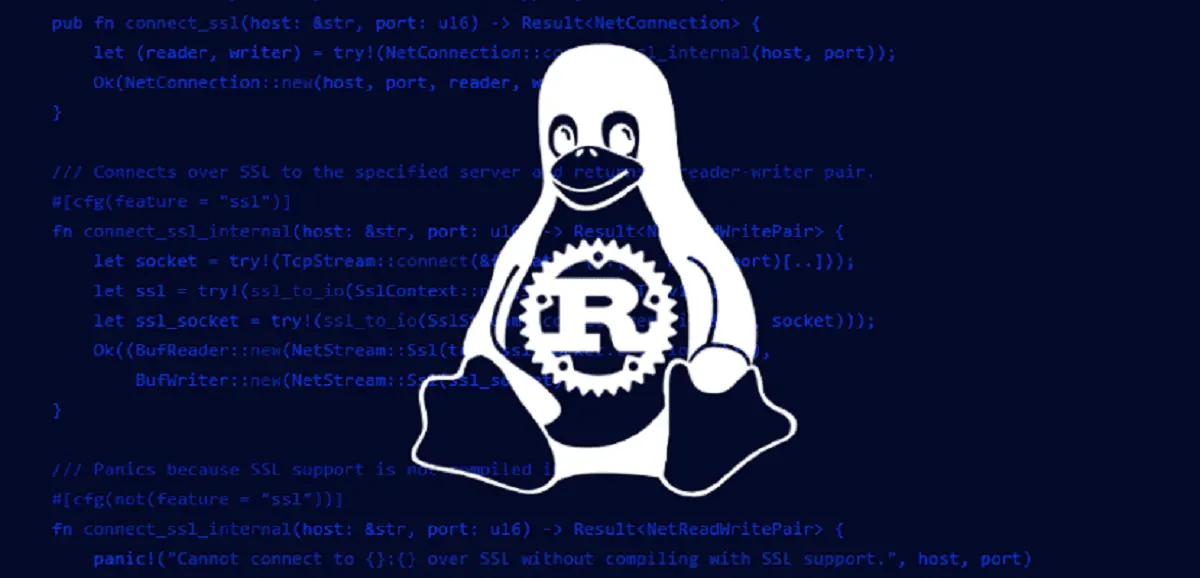
Rust is now ready to join C as a practical language to implement on Linux
This year 2022 could be the year of Rust within the Linux kernel, since Rust for Linux is likely ready for Linux kernel version 6.1. This is what emerges from a recent speech by Linus Torvalds at the last Open Source Summit.
And it is that the main maintainers of the Linux kernel are familiar with the C language whose age is already considered to be taken into account, as some are even approaching sixty, while a new generation of maintainers whose age group is in thirty is rising, which is likely to increase the difficulty of finding maintainers for the Linux kernel if its development continues in the C language.
During the Open Source Summit Europe, Linus Torvalds announced that, barring unforeseen problems, sand will include patches to support the development of the Rust driver in the Linux 6.1 kernel, which is expected to be released in December.
Some of the benefits of getting Rust support in the kernel are make it easy to write controllers of secure devices by reducing the chances of memory errors and encourage new developers to get involved in the kernel.
"Rust is one of those things that I think will bring in new faces... we're getting old and grey," Linus said.
The release notes for Linux 6.0 rc1 provide an update on the progress of the Rust project for Linux: there is a related working group, a preliminary driver for NVMe storage media developed with that language is available, as well as a driver for a server intended for the 9P network protocol.
However, the team continues to face difficulties with the build. In fact, it's done with GCC for the kernel while Rust is still with LLVM. A Rust interface for GCC is in the works, but the initiative is still in its infancy.
The start of Rust support for Linux kernel development considered "an important step to be able to write controllers in a more secure language.” Mozilla Research's Rust is the kind of programming language that those who write code for basic input/output systems (BIOS), boot loaders, operating systems, etc. have an interest
According to observers, it is the future of systems programming rather than the C language. In fact, experts say that it offers better software security guarantees than the C/C++ pair. At AWS, they specify that choosing Rust for development projects means adding the energy efficiency and execution performance of C to the advantage of security.
Linus also announced that version 6.1 of the kernel will improve some of the older parts and kernel fundamentals, such as the printk() function. Furthermore, Linus recalled that a few decades ago, Intel tried to convince him that the Itanium processor was the future, but he responded
“No, this will not happen, because there is no development platform for it. ARM is doing everything right." «
Another problem Torvalds pointed out is the inconsistency in the production of ARM processors:
"crazy hardware companies from the Wild West, making specialized chips for various tasks." He added that "it was a big deal when the first processors came out, today there are enough standards to make it easy to transfer cores to new ARM processors."
Also, we can point to the release of the initial implementation of the rust-e1000 driver for Intel Ethernet adapters, partially written in Rust.
The code still has a direct call to some C bindings, but work is gradually being done to replace them and add the Rust abstractions needed to write network drivers (to access PCI, DMA, and kernel network APIs). In its current form, the driver successfully passes the ping test when booted into QEMU, but it still doesn't work with real hardware.
Finally If you are interested in knowing more about it, you can check the details In the following link.